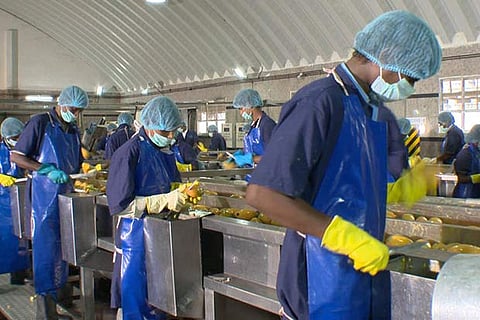

Coimbatore
“It’s not so anymore. Until a decade ago, there were 75 pulp making units. Now there are barely 16 units in operation.
The pulp industry has been hit by unbearable loss, lack of buyers for pulp and unable to invest on advanced technologies to stay afloat in the competitive industry,” said KM Rama Gounder, president of Tamilaga Vivasayigal Sangam.
The situation turned even more worse this year as production of mangoes dwindled due to the existing drought like situation. More than one crore trees got dried up in Krishnagiri district over the last four years affecting hundreds of farmers. The production of mangoes, which used to be around ten lakh tonnes until a few years ago, has come down to a meagre two lakh tonne this season,” he added.
This severe drop in production has in-turn impacted pulp production.
“Pulp production has been reduced to 50 per cent from 1.50 lakh tonnes last year. And pulp exports came further down to just 30 per cent of the usual 1.50 lakh tonnes,” said D Mathiazhagan, managing director of Sri Devaraja Agro Industries in Krishnagiri. He is also the president of Food Pulp Manufacturing Association.
Farmers rued that following a huge short supply of mangoes, the pulp making units, which usually operate for 100 days in a year from mid-April to end of July, had run for just 20 days. Also this season, the units have started using any variety of mango available in the market due to shortage of preferred ones.
There was a proposal to bring pulp making units under a single umbrella to produce mango pulp on a single brand to buyers and market the product in international market.
“The then Krishnagiri Collector Santhosh Babu mooted the initiative. It was even decided to produce the pulp under the brand name ‘Krishma’, but the project failed to take off. It was a huge set back to farmers. So, the firms that buy the pulp tend to market them in their own brands. Similarly, another project announced by former Chief Minister J Jayalalithaa to distribute mango juice to students in government schools hasn’t been implemented,” said Rama Gounder.
Alphonsa, Sendura, Neelam and Totapuri are the common mango varieties used in pulp making. Of them, ‘Totapuri’, which is cultivated in 70 per cent of the district, is the most preferred for pulp production. Mangoes are cultivated in about 45,000 acres of land.
Pulp exports hit due to poor mango production
Export of mango pulp has been hit badly due to poor productivity and lack of buyers.
The pulp is exported to gulf nations, Russia, Singapore, Malaysia, Australia and even to US. However, the demand from these countries has come down sharply over the years.
Exporters claimed that the civil war in Syria has led to a drop in export to gulf, which used to be a transit point. Also the exporters were unable to meet out the standards required by importing nation.
“This year the production of pulp was sufficient only to meet out the domestic demand of our country. Exports could not be done this year as the buyers (middlemen) turned away due to our high pricing following a shortage in mangoes,” said D Mathiazhagan, president of Pulp Manufacturing Association.
Last year, when the production was much better, the pulp units received ‘Totapuri’ variety of mango for a throwaway price of Rs four per kilogram from farmers.
“With heavy arrival of mangoes, the production was good last year. Lesser pricing wooed more buyers for exports. But this year, the same ‘Totapuri’ variety of mango is sold to us for Rs 23 per kilogram,” he added.
The pulp making unit’s source mangoes from across Tamil Nadu and also from neighbouring Karnataka and Andhra Pradesh for making pulp.
‘King Of Fruits’ Pulp Production
Mangoes are harvested in 45,000 acres in Krishnagiri district
Visit news.dtnext.in to explore our interactive epaper!
Download the DT Next app for more exciting features!
Click here for iOS
Click here for Android